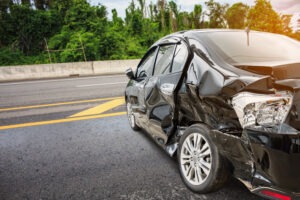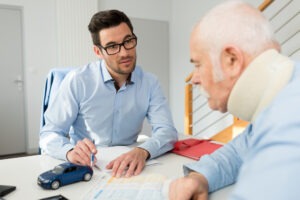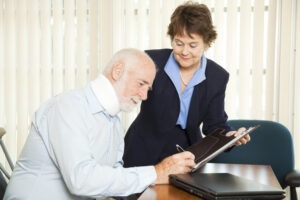
If you were involved in a car accident, you understand how overwhelming it can be. Knowing what to do next can be difficult. However, taking the correct steps after a crash can minimize stress and prevent further complications.
While no one wants to think about being in a car crash, it pays to be prepared for anything. At Simmrin, we want motorists to respond safely in case of mishaps. We all have a responsibility when it comes to helping others after an accident. This article will guide you through the top seven things to do if you’ve been in an auto collision.
1. Assess the Situation
When you find yourself in a car accident, it can feel like the whole world has suddenly stopped. However, despite the shock of the situation, you can take important steps to protect yourself and your vehicle from further injury and damage. Assessing the scene is an important first step to take.
Survey Your Environment With Caution and Care
Start by assessing risk and evaluating any damage done to all the vehicles involved in the incident. Depending on the severity of the crash, this could mean checking for fluid leaks, physical dents, broken glass, or visible structural issues. Then, use hazard lights or flares at night (or whenever visibility is poor) to alert other drivers about the situation.
Next, check for injuries among all passengers involved in the accident, including yours. It’s best not to move anyone unless necessary. Instead, call 911 if anyone needs medical attention right away. In some cases, police may respond before emergency personnel arrives. Keep calm and answer their questions truthfully.
Once everyone is safe, survey the roadway and identify any potential hazards from the accident, such as debris or fallen objects blocking traffic flow. Try not to panic but remain focused on what lies ahead: contacting authorities and returning home safely.
For a free legal consultation, call (310) 896-2723
2. Contact the Police
After you’ve assessed the scene and ensured everyone’s safety, it’s time to contact the police. No matter how minor or severe the car accident is, notifying authorities should be your next step, especially if any injuries are involved. Calling 911 will help ensure that an official record of what happened is kept on file and could help with potential insurance claims.
When reporting a car accident to the police, provide them with as much information about yourself and those involved in the crash as possible, including:
- Your full name
- Driver’s license numbers
- Your home address
- Phone numbers
- Vehicle registration numbers for all cars present at the scene
- Who was driving each vehicle (including passengers)
- Details like speed limit signs nearby
These details can help create a complete picture of events leading up to the incident. Once law enforcement officers arrive on site, they’ll collect statements from all parties involved and write a formal police report based on their findings.
Be prepared to answer questions like:
- How fast were you going when the collision occurred?
- Where were you coming from/going to?
- Did either driver involved appear impaired by drugs or alcohol?
The answers provided will be included in your formal statement, so tell the story accurately and without exaggerating the details.
TIP: Even though talking with law enforcement officials might initially feel intimidating, remember that having an accurate police report is essential for filing an insurance claim. Therefore, don’t hesitate to contact them, as doing so could cost you money if something isn’t properly documented.
3. Exchange Information With Other Drivers
The Federal Highway Administration estimates that over 40,000 people died in auto accidents in 2021, a 10.5% rise in fatalities from the previous year. Therefore, knowing what to do after a collision involving you or a loved one is essential.
Collect Information
First, you’ll want to collect insurance, driver’s license, and vehicle registration numbers from all involved parties. This ensures everyone’s account of events can be tracked down later if necessary.
Also, get contact information for witnesses who may have seen what transpired. Their statements could prove invaluable when filing a claim with your insurer.
Check the Data You Collected
Once all the details are collected, take a few moments to double-check everything before leaving the scene. Sometimes people give incorrect or outdated details, which can be tricky to track down afterward.
If someone refuses to share their information, take pictures of their license plate number instead. This should provide enough detail for contacting them later (if needed). In some cases involving minors or those without valid documentation present on site, police officers may need to step in and assist with collecting necessary data.
Click to contact our Personal Injury Areas We Serve today
4. Document the Scene
After exchanging information with other drivers, it’s time to document the accident scene. This is where having a cell phone or camera handy is useful. Taking pictures of any damage, debris, and skid marks can help provide valuable evidence when filing an insurance claim.
If there are no visible accident injuries, consider sketching out a simple diagram showing how each vehicle was positioned at the time of impact, including details like distances and what direction they were facing. This helps create a clearer understanding of events. Additionally, note down any relevant landmarks around you, as these could prove helpful later.
Finally, don’t forget that eyewitness statements often play a vital role in determining fault after accidents. Therefore, ask potential witnesses if they saw anything that might have contributed to the incident. This includes gathering their contact info should further clarification be needed.
Complete a Free Case Evaluation form now
5. Seek Medical Assistance
It may seem counterintuitive to seek emergency medical assistance after a car accident, especially with no visible injuries. However, it’s important to remember that trauma symptoms can take hours or days to manifest and could be life-threatening, so don’t take the risk.
If you experience pain, discomfort, dizziness, nausea, or confusion, immediately call 911 for emergency services. Don’t forget about your passengers either, and ensure everyone involved receives medical treatment, if necessary.
Additionally, remember that adrenaline levels can mask physical sensations. Therefore, even if you feel fine right now, getting checked out by a doctor is still recommended as it could help detect more serious conditions later.
Collect Medical Documents
When seeking medical attention, keep all documentation from doctors, including any x-rays and lab results, as this might become critical evidence when filing an insurance claim.
While medical bills may seem minor at first glance, these costs can quickly add up over time, and having them covered by your provider could save you hundreds (if not thousands) of dollars in the long run.
TIP: Bring a trusted friend or family member for moral support during checkups. Having someone who understands what you are going through and makes you feel safe can make hospital visits less stressful.
6. Notify Your Insurance Provider
Next, it’s time to notify your insurance provider about the accident. Depending on your policy, you may need to report an incident within 24 of its occurrence, so don’t delay it!
This is especially important if there are any disputes or disagreements between the parties involved. Filing a claim could be essential for protecting your rights and interests.
Before speaking to representatives from your insurance company, gather as much detail as possible, including:
- Names of those present at the scene.
- Contact information for witnesses.
- Insurance documents or other relevant paperwork.
Additionally, avoid making any admissions regarding fault while communicating with an insurance adjuster; explain what happened without drawing conclusions.
Your insurer should also assist when dealing with repairs or replacements, which can be lengthy depending on the severity of your damages. Therefore, take advantage of financial assistance whenever possible.
Keep track of all conversations with insurance agents and store documents related to reimbursement requests. Store your documents securely somewhere accessible in case they are needed.
7. Consult a Car Accident Attorney
After notifying your insurance provider, consider consulting a lawyer. Our auto accident attorneys are experienced in pursuing legal action and can represent you during negotiations or litigation if necessary. In addition, we offer valuable legal advice on how best to proceed when facing a potential court case while ensuring your rights are protected throughout the process.
It is important to find an experienced auto accident firm like Simmrin Law Group that understands the laws surrounding road accidents in your state, as they may vary from place to place across the United States.
Research well-reviewed accident lawyers experienced in representing clients involved in car crashes. Schedule a consultation to discuss any questions or concerns about filing claims for compensation due to injuries incurred during the incident.
How an Attorney Can Help With Your Case
Your lawyer should assist you by gathering evidence such as police reports, medical records, and witness statements. This could help secure better results regarding any settlement offers made by the at-fault driver.
Additionally, a personal injury attorney may advise you against making any statement without their presence (even when questioned by police officers at the crash scene). Therefore listen carefully to what they have to say before proceeding further.
With thorough research and proper guidance from a qualified auto accident attorney, you’ll be equipped with the knowledge to make informed decisions moving forward.
Frequently Asked Questions
Car accident cases are some of the most common types of personal injury cases. When taking legal action, it is important to understand the process. Knowing what questions to ask can help you build a strong defense and get maximum compensation.
Commonly asked questions about car accident cases revolve around reporting a crash, documenting the scene, and the statute of limitations for filing a personal injury claim. Understanding these topics is key when navigating a car accident case.
What Are the Legal Requirements for Reporting an Accident to the Police?
When you’ve been in an accident, one of the most important things to do is to know your legal requirements. In the following, we’ll examine the legal requirements for reporting an accident to the police and why it matters.
Crashes can happen anytime, so understanding the laws around them is key. However, the law surrounding car accidents varies from state to state. Therefore, drivers involved in certain types of crashes must report them directly to local authorities or insurance companies.
At a minimum, if you’re involved in a motor vehicle collision involving serious injury or death, get a police report as soon as possible. The officer responding at the scene will write an accident report detailing the incident.
The Value of an Accident Report
A police report after a car accident can be incredibly valuable in helping your case. First and foremost, the report provides an official record of the accident, which can help establish liability and provide evidence in the event of a legal dispute or insurance claim.
The report includes details about the circumstances surrounding the accident, including:
- The date
- Time and location
- Witness statements
- The at-fault driver’s name
- Contact information for everyone involved in the incident
- License plate numbers
- Insurance information
- Observations made by responding officers
This information can be used to support your version of events and disprove any false claims made by the other party. Overall, a police report can be an essential tool in building a strong case after a car accident.
How Can I Accurately Document the Scene of the Accident?
Accurately documenting the scene of a car accident is essential for legal and insurance purposes. Accurate details can make all the difference when filing an accident claim.
For starters, take photos or videos that show each vehicle’s position at the time of impact. This will help you remember exactly what happened and provide evidence in case of any fault dispute later.
Additionally, locate witnesses who may have seen what occurred and get their contact information so they can be contacted later for further testimony.
Also important is making sure to record documentation details such as:
- Date and time
- Weather conditions
- Road conditions
- Skid marks
- Other debris from the crash site
Document anything that might help recreate the scene more accurately for evaluation and investigation by police officers or insurance adjusters. Furthermore, note any damage to your vehicle, including dents and scratches.
You should also jot down the license plate numbers of cars involved to ensure accuracy when filling out forms related to this event.
It’s critical not to forget these three key things:
- Take accident photos: As stated above, photograph both vehicles before they are moved (if applicable). Take pictures from multiple angles, so nothing gets left out!
- Gather evidence: Collect items like broken glass pieces or tire tracks, which could be proof during investigations or court hearings.
- Record facts and figures: Write down the names and addresses of those involved in addition to recording the exact locations where everything took place. Even small details can become big clues during an investigation.
Capturing details with precision can help protect yourself legally while allowing authorities to assess who was at fault in an accident. Moreover, having solid evidence backed up by facts makes everyone’s job easier when dealing with potential disputes over liability afterward, ultimately saving time and money for all parties involved.
How Long Do I Have To Report a Car Accident to My Insurance Company?
You may need to report it quickly, depending on state laws and the accident’s severity. For any claims or repairs related to a crash to be covered by your insurance policy, you must inform your insurer about the incident as soon as possible. They might not honor any claims or cover your losses if you wait too long.
For many insurers, this means you should call them shortly after, ensuring everyone at the scene is safe, exchanging information with other drivers involved, and ensuring all relevant documentation has been collected.
How Long Do You Have To Report a Crash to Your Insurer in Los Angeles?
The time required for filing a claim varies from state to state. For example, in Los Angeles, it is recommended to report a car accident to your insurance company as soon as possible, ideally within 24 hours of the incident.
That said, your insurance policy may have specific requirements or time limits for reporting motor vehicle crashes. Therefore, check your policy or contact your insurance provider to confirm their requirements.
Once you’ve reported the incident to your insurance company, they will likely ask you additional questions about the crash. This helps ensure that everything is properly documented, avoids misunderstandings, and confirms whether anyone was injured or if there were witnesses present. However, you should not talk to the auto insurance company without legal representation.
Protect Your Rights
Being prepared by knowing what steps are necessary following an auto accident isn’t just critical for ensuring financial stability; it can also help protect yourself legally if another party decides to take action against you.
Knowing how long you have before needing to contact your insurance provider can go a long way toward avoiding expensive delays when filing a claim, so make sure to familiarize yourself with applicable regulations ahead of time!
What Sort of Medical Assistance Should I Seek After a Car Accident?
In the event of a collision, it is essential to seek medical assistance. No matter how minor you think your injuries are, consult with medical professionals who can accurately assess and diagnose any potential trauma that may not be immediately apparent.
When considering what kind of medical help to seek after an auto collision, there are certain steps you should take to ensure that all your health needs are thoroughly addressed.
Immediately following a car crash, you should evaluate your physical condition by identifying a sensation of pain or discomfort anywhere in the body. However, the absence of pain does not necessarily mean you are injury free. The adrenaline of surviving a traumatic event can numb you and mask the pain.
Visit a Medical Facility
When looking for medical help after a car accident, one option is visiting an urgent care center that offers walk-in appointments and can provide quick diagnoses and treatment for minor injuries like scrapes and bruises.
For more serious traumas like broken bones or head injuries, emergency rooms have certified staff members who specialize in these kinds of cases and can provide higher levels of care accordingly.
Insurance Coverage for Medical Expenses
Finally, having insurance coverage will make this whole process much easier. Most plans cover medical expenses related to motor vehicle collisions so long as they were reported within a reasonable time.
Be sure to contact your provider right away if you need financial support during this difficult period. They’ll typically require proof of injury through official paperwork from a doctor before reimbursing any charges incurred at hospitals or clinics.
It’s always wise to err on the side of caution when dealing with matters concerning our health. Therefore, please don’t wait until it’s too late; get checked out today!
Should I Consult an Attorney Even if I Was at Fault for the Accident?
This is a question people often ask themselves in the aftermath of a traumatic event. After all, there are many potential legal implications to consider, and knowing how liability will be established can be difficult.
Understand Your Rights
Consulting with an experienced lawyer can help ensure that any responsibility attributed to you will be fair and reasonable according to the law. Furthermore, having proper legal representation during negotiations or litigation related to the case can give you peace of mind knowing that all possible liabilities arising from the accident are properly addressed.
Negotiate With Insurance Providers
Attorneys experienced in car accidents understand how auto insurance companies work and can assist you in making sure whatever settlements they offer adequately cover your damages caused by the crash. This could involve negotiating full coverage of medical bills and other associated costs.
Knowing what evidence to gather and how best to present it within court proceedings can also save valuable time and money in obtaining justice or reparations for accident victims.
File Within the Statute of Limitations
Some states impose a statute of limitations on filing claims involving personal injury cases resulting from vehicular collisions, meaning that certain deadlines must be met before pursuing legal action. Our experienced attorneys are familiar with these laws and can advise accordingly so no further delays occur.
Navigate the Legal Process
Finally, hiring a qualified legal professional can provide invaluable insight into navigating complex liability issues surrounding auto accidents. Our legal team can advise you on various options available depending on individual circumstances.
In short, consulting with an attorney following a car accident (even if you may be at fault) is highly recommended, given its numerous benefits ranging from financial protection to improved chances of success with your case.
Contact Simmrin Law Group Today
The aftermath of a car accident can be overwhelming and traumatic. It’s important to take the steps necessary to protect yourself legally, physically, and financially to avoid further issues or complications. By following these seven simple steps after an automobile collision, you won’t crash and burn; you’ll stay safe!
To ensure you are properly compensated, it is vital to seek qualified legal counsel. The car accident lawyers at Simmrin Law Group have years of experience representing drivers injured by negligent drivers. Our experienced legal team will employ all available resources to help you get the full and fair compensation you deserve.
Contact us today for more information or to schedule an appointment with one of our car accident lawyers.
Call or text (310) 896-2723 or complete a Free Case Evaluation form




